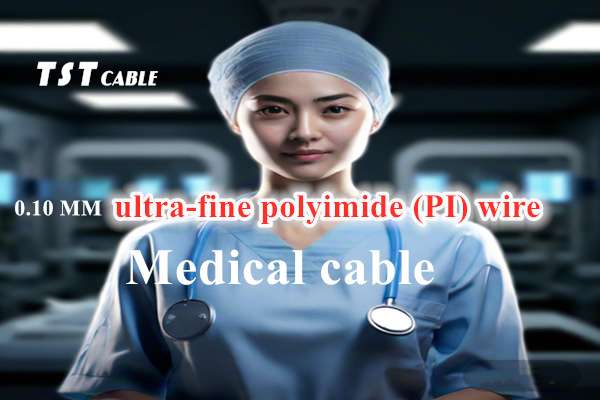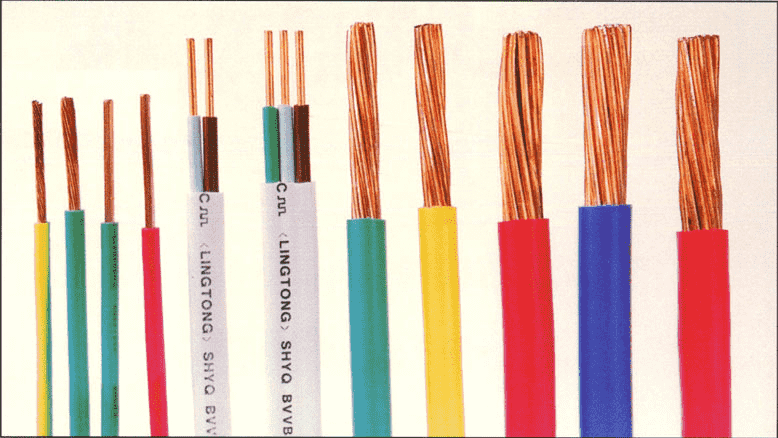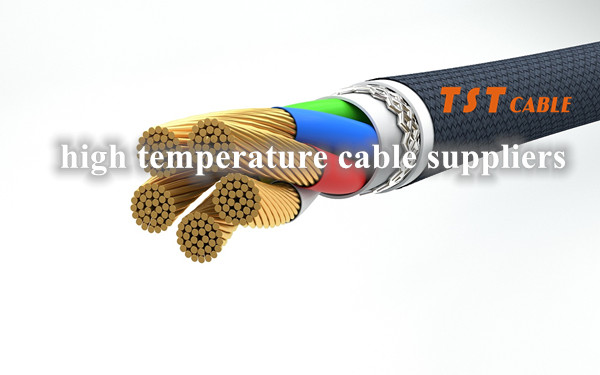Polyimide cable is a high-performance special cable, which is known for its excellent electrical properties, thermal stability, chemical stability and mechanical strength. As a high-performance polymer, polyimide cable (Polyimide cable, PI cable) is often used as an insulation material or sheath material for cables by cable factories, especially for applications in extreme environments. The following is a detailed introduction to polyimide cables:

Features of polyimide cables
1. Excellent thermal stability: Polyimide has very high thermal stability and can be used for a long time at an operating temperature of up to 260°C, and can withstand higher temperatures for a short time. TST CABLES high-temperature cable has a maximum temperature resistance of up to 1200°C.
2. Good electrical properties: Polyimide has extremely high dielectric strength and low dielectric constant, and is suitable for high-frequency and high-voltage applications.
3. Chemical stability: Polyimide can resist the erosion of most chemicals and is suitable for corrosive environments.
4. Mechanical strength: Polyimide materials have high tensile strength and tear resistance, and are suitable for applications with high mechanical stress.
5. Wear resistance: Polyimide materials have good wear resistance and are suitable for use in friction and wear environments.
Application fields of polyimide cables
Due to their special properties, polyimide cables are widely used in the following fields:
Aerospace: Due to their excellent heat resistance and electrical properties, polyimide cables are very suitable for use in spacecraft such as aircraft, rockets, and satellites.
Military equipment: Polyimide cables are also widely used in military equipment, such as radars, missile control systems, etc.
Industrial automation: In industrial automation equipment working in high-temperature environments, such as steel mills, petrochemical plants, etc., polyimide cables are an ideal choice.
Medical equipment: Used in medical equipment that requires high reliability and precision, such as MRI machines, CT scanners, etc.
Rail transportation: In rail transportation equipment such as high-speed railways and subways, polyimide cables can cope with complex temperature changes and mechanical stress.
Polyimide Cable Manufacturing Process
The manufacturing of polyimide cables usually involves the following steps:
1. Raw material preparation: Select high-quality polyimide film or powder.
2. Insulation layer production: Wrap the polyimide film around the conductor to form an insulation layer.
3. Wrapping and shielding: As needed, additional wrapping materials or metal shielding layers can be added to the insulation layer to increase mechanical strength or electromagnetic shielding effect.
4. Sheath layer: Finally, the sheath material is added to the outer layer, usually a material with good heat resistance, to protect the internal structure from the external environment.
Precautions for polyimide cables
Although polyimide cables have many advantages, the following points should also be noted during use and installation:
Installation temperature: Ensure that the ambient temperature is suitable during installation, and avoid operating at extreme temperatures to avoid affecting the performance of the cable.
Bending radius: Pay attention to the minimum bending radius of the cable to avoid damage to the insulation layer due to excessive bending.
Storage conditions: When storing, pay attention to moisture and dust prevention, and store in a ventilated and dry place.
Polyimide cables play an irreplaceable role in the high-tech field due to their excellent performance. With the continuous development of technology, polyimide cables will continue to play an important role in more high-end applications to meet the growing technological needs.
Application of polyimide cables
1. Cables for aerospace equipment
In the aerospace field, polyimide cables are favored for their excellent heat resistance, chemical stability and mechanical strength. Specific applications include:
Interior wiring of aircraft: polyimide cables can be used for power transmission and signal transmission inside the aircraft to ensure reliability under high temperature and vibration environments.
Satellites and rockets: In satellites and rockets, polyimide cables are used in various control systems and data transmission systems, and can maintain stable performance under extreme temperature changes and space radiation environments.
Aerospace engines: The ambient temperature around the engine is extremely high, and polyimide cables can withstand these extreme conditions to ensure the accuracy of signal transmission.
2. Cables for military equipment
Military equipment has very high requirements for cables, especially reliability in harsh environments. Applications of polyimide cables include:
Radar systems: In radars and other communication equipment, polyimide cables are used for high-frequency signal transmission to ensure the clarity and reliability of data transmission.
Weapon control systems: In weapon systems such as missiles and tanks, polyimide cables are used to control the transmission of signals and can maintain normal operation under combat conditions.
Submarines and ships: In naval equipment, polyimide cables can withstand seawater corrosion and deep-sea pressure and are used for power transmission and signal control inside ships.
3. Industrial automation cables
In the field of industrial automation, polyimide cables are widely used due to their wear resistance and chemical corrosion resistance:
Robots: In industrial robots, polyimide cables are used to connect components such as sensors and actuators, and can maintain the integrity of the cables and the stability of the signals during frequent movements.
High temperature environments: In high temperature environments such as steel mills and petrochemical plants, polyimide cables can be used for power transmission and signal transmission to ensure the continuity and safety of the production process.
Precision instruments: In instruments and equipment that require high-precision control, polyimide cables can provide reliable signal transmission to ensure the accuracy of measurement and control.
4. Cables for medical equipment
In medical equipment, the applications of polyimide cables include:
MRI and CT scanners: In these devices, cables need to withstand strong magnetic fields and high-frequency signals, and polyimide cables can meet these requirements.
Surgical instruments: In surgical instruments, polyimide cables are used to connect various sensors and actuators to ensure precise control during surgery.
Implantable medical devices: In implantable medical devices such as pacemakers and neurostimulators, polyimide cables can provide long-term stable performance to ensure patient safety.
Technical development trends of polyimide cables
With the advancement of science and technology, polyimide cables are also developing. Some new technologies and application trends include:
Composite materials: Combined with other high-performance materials (such as extruded PI wire, carbon fiber, ceramics, etc.), new cables with higher strength and better heat resistance are developed.
Nanotechnology: Use nanotechnology to improve the performance of polyimide materials, so that they have better mechanical strength, higher thermal stability and lower dielectric constant.
Smart cables: Integrate sensors and smart components to realize cable status monitoring and fault warning functions, and improve the reliability and maintenance efficiency of cable systems.
Is extruded polyimide cable (PI cable) better or wrapped polyimide cable (PI cable) better?
In the medical field, precision and reliability are eternal pursuits. Today, an exciting innovation is quietly changing the pattern of medical wires – thinner extruded polyimide wires, bringing new possibilities to the medical industry.
Medical wrapped polyimide wires have always played an important role in medical equipment. However, with the continuous advancement of technology, we have found a better choice – extruded polyimide wires. This new type of wire, with its advantages of good density and airtightness, can make the insulation layer thinner, and the entire cable can be thinner and smaller, and it also shows excellent performance. It is gradually becoming a new favorite in the medical field.
Advantages of extruded polyimide wires
Thinner extruded polyimide wires have many advantages. First of all, it maintains the excellent properties of polyimide materials while achieving a slimmer size. This means that in medical equipment, it can take up less space, providing strong support for the miniaturization and refinement of equipment. Whether it is a precision medical device or a portable diagnostic device, thinner wires can be easily integrated into it without affecting the overall performance of the device.
Its excellent mechanical properties are impressive. In a medical environment, wires may be subject to various external forces, pulling and bending, and extruded polyimide wires have excellent strength and toughness, which can withstand these challenges without breaking easily. This not only ensures the stable operation of the equipment, but also reduces the repair costs and downtime caused by wire damage.
Its smooth surface and scratch resistance are also a highlight. In medical places, wires often come into contact with various objects and are easily scratched. Extruded polyimide wire can effectively resist scratches, keep its appearance intact, and extend its service life. Whether in a busy operating room or in a daily ward environment, it can always maintain reliable performance.
Its chemical resistance makes it a natural choice in the medical field. Medical processes often come into contact with various chemicals and disinfectants, and traditional wires may be corroded and affect performance. The extruded polyimide wire has excellent density and airtightness, and has good tolerance to a variety of chemicals, ensuring stable operation in various complex medical environments.
High temperature stability provides a guarantee for the safe operation of medical equipment. In some special medical operations, the equipment may generate higher temperatures. Thinner extruded polyimide wires can remain stable in high temperature environments and will not experience performance degradation or safety hazards due to temperature increases.
In addition, the characteristics of low dielectric loss are crucial for some medical devices that need to transmit high-frequency signals. Extruded polyimide wire performs better in this regard. It can ensure the transmission quality of the signal and ensure the accuracy of medical diagnosis and monitoring.
Test comparison of extruded polyimide wire and wrapped polyimide wire
| Category | Conductor diameter (mm) | Finished product outer diameter (mm) | Insulation thickness (mm) | Scratch resistance times (10N) | Elongation (%) | Withstand voltage (Kv) | Insulation resistance (MΩ/Km) |
| Wrapped polyimide wire | 0.50 | 0.97 | 0.235 | 178 | 31.2 | 10.0 | 2332 |
| Extruded polyimide wire | 0.40 | 0.60 | 0.10 | 5100 | 37.7 | 12.0 | 10800 |
From the above comparison data, it can be seen that despite the greatly reduced thickness of the insulation layer, the various performances of the extruded polyimide cable can still be improved, and it can be seen that the advantages of thinner extruded cables are more obvious.
Future prospects for the development of polyimide cable technology
With the development of new material science and technology, future polyimide cables are expected to achieve higher performance indicators and meet more demanding application requirements. At the same time, the concepts of environmental protection and sustainable development will also prompt the cable manufacturing industry to adopt more green materials and production processes, and promote the development of polyimide cables in a more efficient and environmentally friendly direction. Choosing TST CABLES’s thinner extruded polyimide wire means choosing higher quality and more reliable performance, which can completely replace the wrapped polyimide wire. It brings new opportunities and challenges to the medical industry and drives medical technology forward. Let us welcome this transformation of medical cables together and provide patients with more accurate and safer medical services. With its excellent performance, polyimide cables play an important role in many high-tech fields and will continue to expand their application scope and technical boundaries in the future.
In today’s pursuit of ultimate performance and stability, TST CABLES’ new generation of polyimide extruded cables are high-performance specialty cable solutions designed for extreme environments. Using advanced polyimide materials, our cables not only have excellent heat resistance and chemical stability, but can also operate continuously and reliably at operating temperatures of up to -260°C~1200°C. Whether in the fields of aerospace, military equipment or industrial automation, polyimide cables can easily cope with harsh challenges. Its excellent electrical performance, extremely low signal attenuation and outstanding mechanical strength ensure accuracy and stability in high-frequency transmission. If you need a customized cable, please feel free to email TST CABLES cable engineers (email: lixiangchao@testeck.com) to communicate and get free samples.
Also available in:
English




